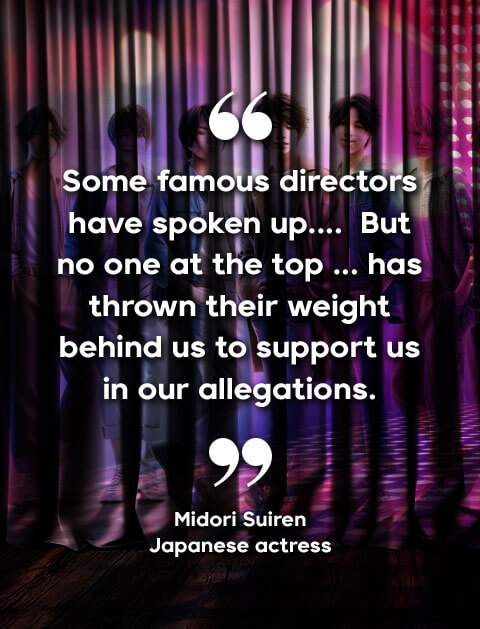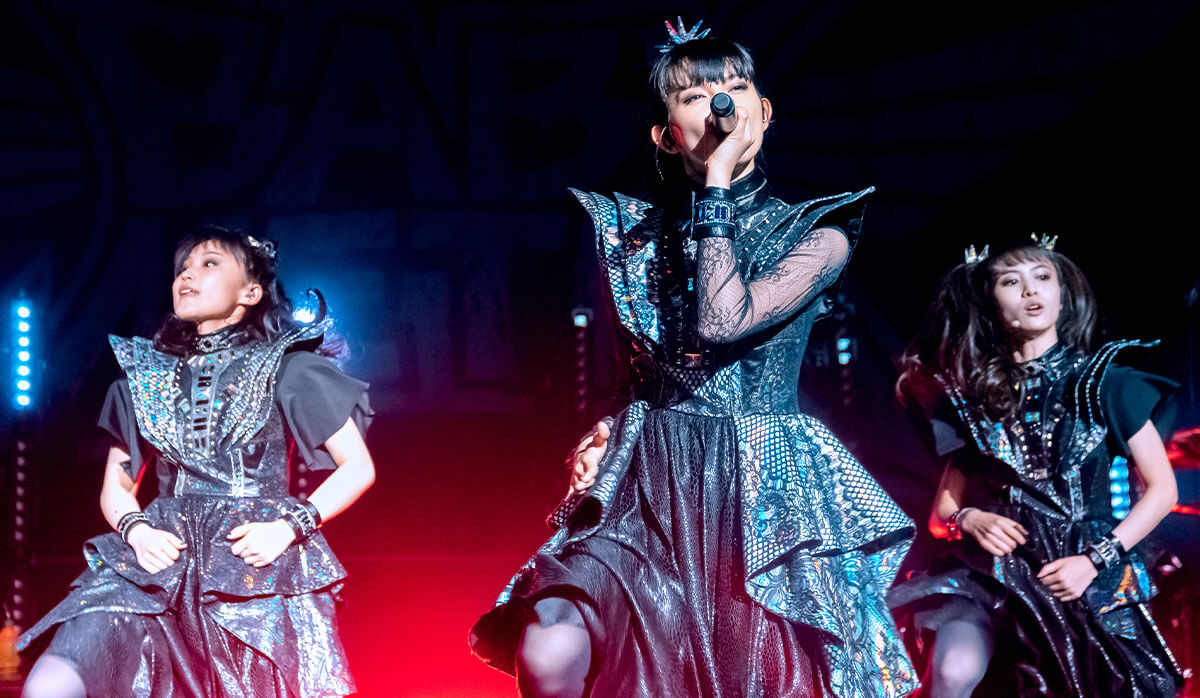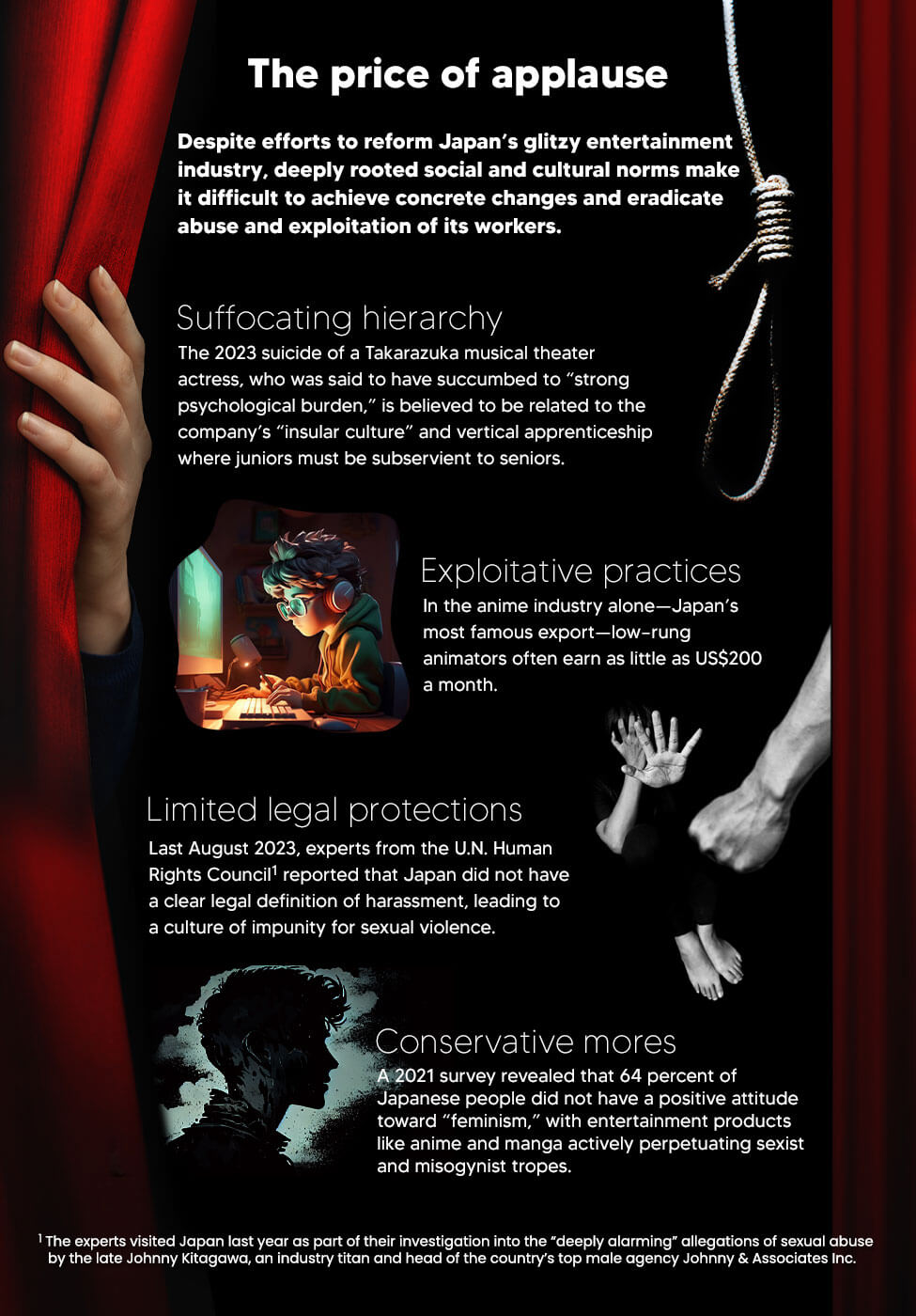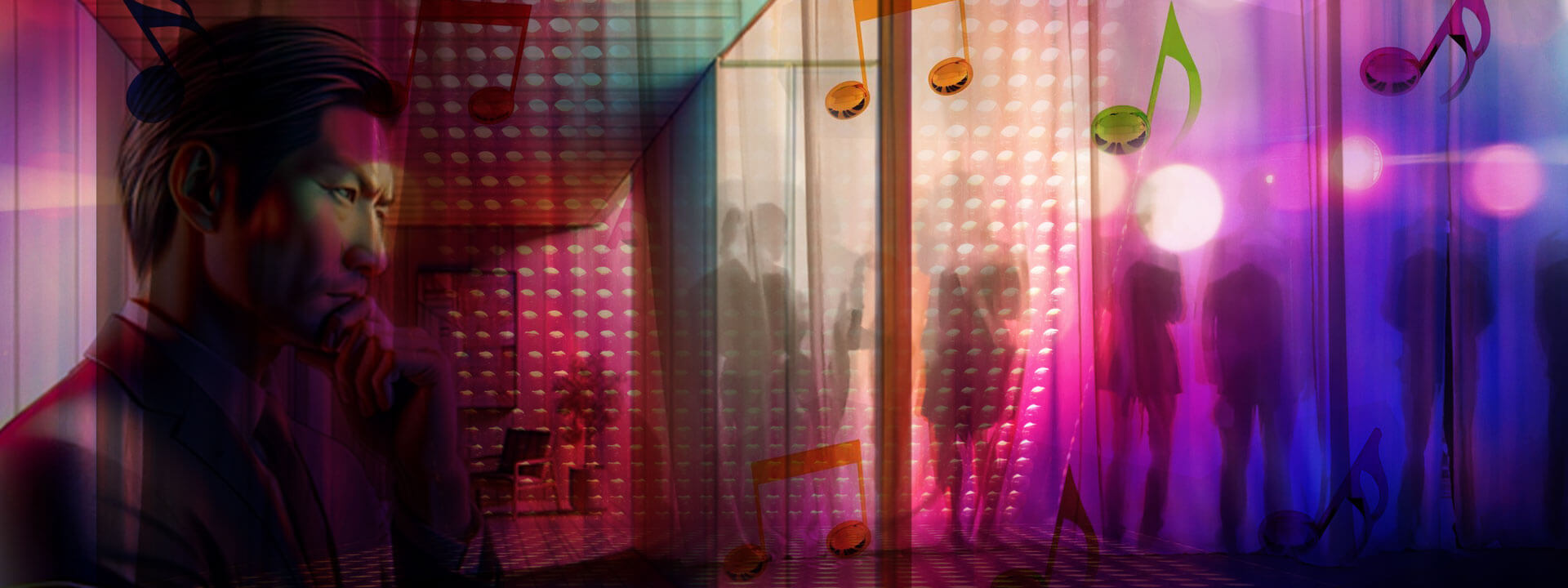|
Getting your Trinity Audio player ready...
|
News emanating from Japan’s illustrious entertainment industry1 has gone from bad to worse in recent months, and has run the gamut from low wages and overwork to sex scandals and suicides. Yet while artists and advocates have formed organizations in a bid to protect those working in the sector, few insiders and observers expect any significant reforms to come anytime soon.
Indeed, many note that despite the growing number of industry insiders who have been stepping forward to bear witness to the abuses, little has been heard from government officials that would indicate any interest in what has been happening.
Labor lawyer Yamamoto Sato says that major reforms can only be expected once the government is forced to take the lead. “But that again is dependent on social pressure, which is not forthcoming due to low awareness of human rights in Japan, with people viewing entertainment as solely an environment for business,” he says.
In fact, one of the two suicides that the industry suffered late last year seems to indicate weak public sympathy for those who had experienced sexual abuse in the hands of the late bigtime talent manager Johnny Kitagawa.
Months before he took his own life, the 40-something suicide victim had been among those formerly managed by Kitagawa’s Johnny & Associates agency who made media appearances for their tell-all. The former Johnny’s talents had formed Johnny’s Sexual Assault Victims Association (JSAVA). They said they had been abused by Kitagawa when they were teenagers. But the JSAVA members, including the suicide victim, soon became targets of online harassment and were accused of lying for financial gain.

A public poll by Nippon.com, a private database company last December also revealed that at least 46 percent of the members of the Johnny & Associates’ fan club said that they had not changed in their support for him while 21.8 percent stated they supported him more.
Once considered a “national institution,” Kitagawa was credited for having masterminded the J-pop boy band wave across Asia in the 80s and 90s. For decades, his agency towered over Japan’s entertainment industry so much that it could command choice slots and hefty fees for its talents in TV shows.
Yet many say that it was an industry open secret that Kitagawa was abusing his teenage talents. And while a Japanese weekly reported on the abuse a decade ago, the story was not picked by the major media outlets. Eventually, the issue faded away. In 2019, Kitagawa died of a stroke.
Then in March 2023, the BBC released a documentary on Kitagawa’s abuses. This apparently encouraged some of his past victims – said to be around 478 – to speak up in public about their experiences. Japan’s mainstream media also began to cautiously cover the issue.
Still, it took several more months before the country’s commercial broadcasters association released a statement apologizing for not covering Kitagawa’s abuses earlier.
“We regret the lack of coverage of sexual crimes by Johnny Kitagawa,” said the association’s spokesperson, Ryunosuke Endo of Fuji Television, last September:

Looking the other way
In truth, Japanese mainstream media hardly cover sex crimes or labor exploitation in the entertainment industry despite suicides from overwork or stories of sexual assaults that had surfaced in the past. An October 2023 government white paper on preventing karoshi, or death from overwork, even said that 25 percent of the country’s actors, stunt actors, and voice actors had experienced sexual harassment, such as being touched excessively by their superiors and pressed to have sexual relations.
Observers and insiders alike attribute the mainstream media’s tendency to look the other way to the strong ties between television companies and the production firms and agencies that provide popular talents who help raise viewer numbers.
One result of that deliberate disinterest, lawyer Sato says, is that news on abuses in the industry become restricted to weekly magazines or social media. This, he argues, makes the abuses a “scandal” rather than a “social problem that needs to be rectified.”
Such “social problems” unfortunately involve thousands of minors vying to become the next big Japanese idol or celebrity. Each year, hordes of young performers join small and medium talent agencies that lure them with promises of turning them into stars.
Among these thousands of wanna-be idols are teenage girls who sing and dance while wearing revealing attires, consequently attracting mostly male fans. Revenues from their live-streaming performances, concerts, and souvenirs or merch have been estimated to more than JPY 200 billion (US$1.3 billion) a year — and growing.
But Sato says that for all their popularity, the majority of Japanese idols grapple with exploitative contracts that tie them to long working hours for low pay without ensuring protection against sexual harassment. Agencies also usually prohibit idols from talking about their activities or even changing jobs.
“There are no guidelines set by the Labor Standards Inspection Office for idols,” Sato says. “Their contracts are not viewed as illegal but rather a personal agreement with the agency.” He notes that Japan is way behind the United States and even South Korea in passing laws that protect the rights of minors and performers.
Sato is advocating for a law covering children in entertainment – including idols – that would contain conditions such as ensuring that young performers are able to pursue higher education and are protected from sexual exploitation.

Others say that prevailing attitudes within the industry also need to be addressed if any change is to happen. Comments cinematographer and activist Shin Hayasaka: “Perhaps the biggest obstacle facing reform in the entertainment industry is the attitude of the conservative male-led industry that puts priority on business interests. They view workers as cheap commodities without individual rights.”
Hayasaka says among the most vulnerable to exploitation in the entertainment industry are the freelancers. Government data support his claim. A survey conducted by the Economy, Trade and Industry Ministry in 2019 revealed that more than 60 percent of freelance workers in the country’s film production had no legally recognized job orders or contracts and earned an income of less than JPY 3 million (around US$20,400). In 2022, government data pegged the average annual income of film industry workers at JPY 4.5 million (US$30,555).
Toothless guidelines?
Since last year, guidelines have been in place requiring film companies to issue contracts to workers, maintain 13-hour workdays, and allow at least a full day of rest every two weeks. But as a May 8, 2023 editorial in the Yomiuri Shimbun pointed out, meeting all these criteria is not a requirement before a film can be released. Moreover, the editorial said, “there are only four staff members at the organization in charge of inspections, so it is difficult to say that the organization is sufficiently staffed to keep an eye on film production worksites.”
Observers also say that general guidelines aimed at preventing sexual violence and “power harassment” in the workplace, including those in the entertainment industry, apply only to full-time employees. There are no penalties as well for companies that do not comply with the guidelines.

Another major grouse is that Japan has yet to ratify the International Labor Union Convention concerning the Elimination of Violence and Harassment in the World of Work that also covers gender-based discrimination.
The situation has driven some members of the entertainment industry to try pushing for some action on their workplace concerns. Last April, cinematographer Hayasaka launched the Association to End Sexual Abuse in Film. Comprising 12 popular artists, the organization has taken the unprecedented step of going public with allegations of sexual violence by certain film directors.
Among its aims are to force the government to establish a third-party committee to probe the allegations, as well as have a swift enactment of protective regulations.
Actress and association member Midori Suiren rues that it took her nearly seven years before she was able to publicly accuse her attacker, attributing her silence to her low awareness of her rights in a society that gives more importance to hierarchy than the individual.
“I was even told by confidantes at that time that I will not survive in the industry as an actress if I don’t like sex,” Suiren says. She adds, however, that she has been wracked with guilt for not disclosing the rape earlier to protect other women.
In a press conference in late November, Suiren accused actor-film director Hideo Sasaki of raping her in 2015, when she auditioned for one of his films. In 2022, Sasaki was also accused of sexual abuse by several other actresses, leading to his film Mitsugetsu (Confession) being pulled from release.
Sasaki has denied the allegations. Meanwhile, Suiren says that she has been diagnosed with post-traumatic stress disorder (PTSD). She used to be torn between recognizing her own trauma as a human rights violation and accepting the abuse as a norm in the film industry, she says. Then again, for the longest time, she says that “I had very few outlets for justice.”
She recalls that legal experts discouraged her from filing a case, since at the time Japan`s law on rape demanded evidence such as physical injury caused by the attacker as a condition for a lawsuit.
It was not until Japan’s lawmakers were put under constant pressure by the “Flower Demo” led by women activists that the country in 2023 finally got a revised law on rape. Today the law defines rape as “non-consensual sexual intercourse” and the clause stipulating physical violence as a requirement for filing suit has been dropped. The age of consent is now 16 years instead of 13 years.
Last October, internationally acclaimed film director Hirokazu Kore-eda led several of his colleagues in issuing a statement denouncing sexual violence in the industry. Although appreciative of the gesture, Suiren remarks, “Some famous directors have spoken up for new protective legislature for actors. But no one at the top, despite their influence, has thrown their weight behind us to support us in our allegations.” ◉
1Japan’s entertainment industry adds billions of dollars to the state coffers annually. According to the global data platform Statista, it was projected to generate revenues of some US$2 billion in 2022 alone.



















